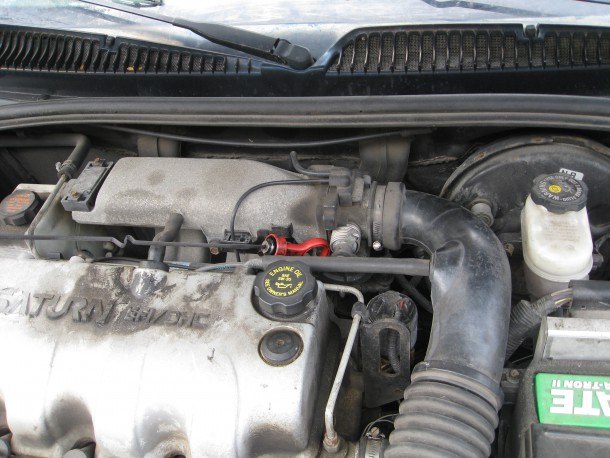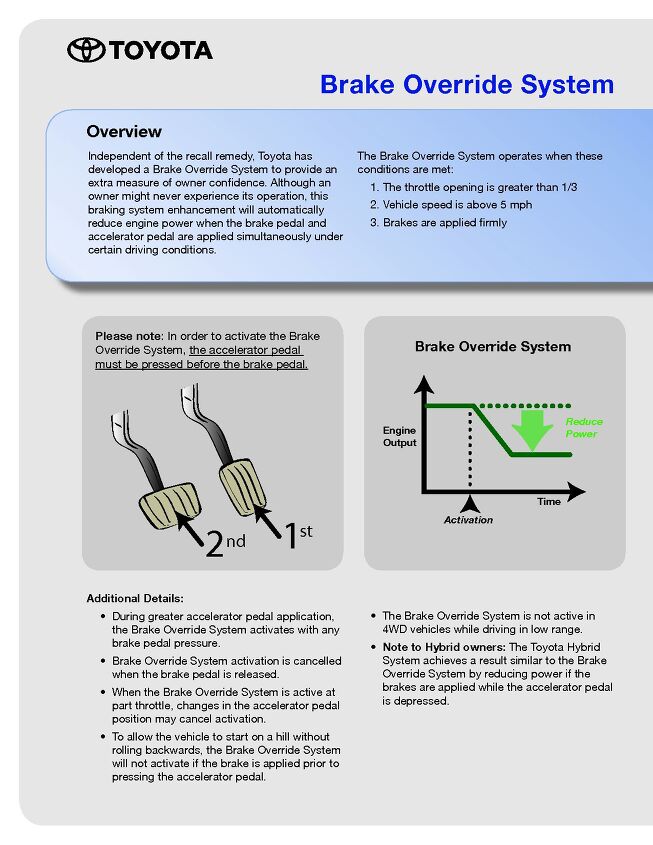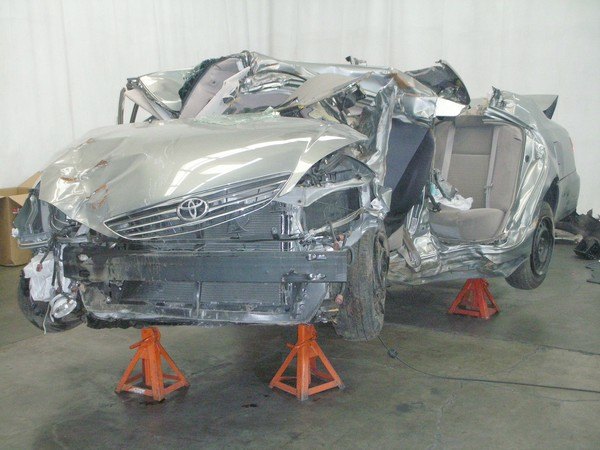#UnintendedAcceleration
Tesla Faces a Potential NHTSA Investigation for Cybertruck Accelerator Pedal Problems
Remember the Toyota stuck accelerator fiasco? Pepperidge Farm remembers. It’s now Tesla’s turn, as the automaker recently issued a stop-sale for an issue with the Cybertruck’s accelerator pedal. Though unconfirmed, the move could be related to a recent TikTok video from an owner, in which the Cybertruck owner demonstrated that his Tesla’s accelerator pedal cover could come loose and cause it to stick in the open position.
Curb Your Acceleration: Aging Drivers Spur Toyota Into Action
A rising number of elderly drivers — and pedal misapplication crashes — in its home market has compelled Toyota to engineer a solution.
The automaker announced Monday that a new “acceleration suppression function” combining data collected from real-word driving and its existing Toyota Safety Sense suite of driver-assist features will determine, and intervene, when a driver hits the wrong pedal.
Feds Pull a U-turn on Mandatory Brake-Throttle Override
A decade after a well-publicized fatal crash involving a Lexus ES 350, the National Highway Traffic Safety Administration has withdrawn a proposal calling for mandatory brake-throttle override systems.
The NHTSA proposed the regulation after several incidents involving Toyota vehicles with jammed accelerator pedals, but now the federal agency says it’s no longer needed. Automakers responded in the absence of a hard rule, eventually equipping all vehicles with the feature. Problem solved?
Not so fast, say safety advocates.
Junkyard Find: 1979 Audi 5000
Before the Audi 5000 (the 100 or 200 outside of the US market) became notorious for playing the lead role in the first unintended acceleration fiasco (technically, the Ford “park-to-reverse” fiasco involved unintended shifting, not acceleration), it was known as an expensive, luxurious German car purchased by a handful of car-savvy California orthodontists. Sales of the first-generation 5000 began in the 1978 model year, so this high-mileage ’79 is a rare one. I spotted this lil’ beige devil in a Denver-area self-service yard last week.
Junkyard Find: 1990 Audi 100 Quattro Sedan
The C3 Audi 100 was sold in the United States badged as an Audi 5000 … until the “unintended acceleration” nightmare nearly killed Audi in North America and the company decided, after a few years of abysmal sales numbers, to go ahead and call this car the 100 over here. Because so few were sold, the 1989-1990 Audi 100s are very, very rare these days.
Here’s one that I spotted in a Denver-area yard a couple of weeks back.
A Case of Unintended Acceleration; Why Some Drivers Panic
I recently did something stupid that put me in a dangerous situation, but it taught me a lot.
Ever since the days of the Audi 5000’s unintended acceleration issue (yes, grasshopper, Toyota wasn’t the first automaker to face the matter), I’ve wondered something.
Even if the problem really is a mechanical or electronic defect causing the acceleration (I’m in the skeptics’ camp on that, the component between the seat and the steering wheel is likely the defective one), why didn’t the drivers just shift into neutral and use the brakes to slow and then stop the car?
Toyota Ordered To Pay $11M In Minnesota Unintended Acceleration Suit
Nine years after a 1996 Camry with an accelerator defect led to a fatal accident in Minnesota, Toyota was found at fault and ordered to pay $11 million.
Toyota Reportedly Near $1B Settlement of Unintended Acceleration Criminal Probe
Reuters and The Wall Street Journal reported on Friday that Toyota Motor Corp. and the United States Department of Justice are close to a deal that would resolve a criminal investigation into how it disclosed to government regulators customers’ complaints about unintended acceleration. The Journal is reporting that the settlement would involve Toyota paying as much as $1 billion in fines, ending a four year investigation. Sources say that the deal could still fall apart, or the amount of money involved could change.
California Jury Finds Toyota Not At Fault In Unintended Acceleration Wrongful Death Lawsuit
A Califonia jury ruled that Toyota Motor Corp was not at fault in a 2009 accident in which 66 year old Noriko Uno was killed when her 2006 Camry ran into a tree after being hit by another car. Uno’s survivors blamed the accident and her death on unintended acceleration and Toyota’s failure to incorporate a brake-override system in Uno’s car. This was the first wrongful death lawsuit over accusations that Toyota products could uncontrollably accelerate. The jury found that Uno’s Camry was not defective, instead placing full liability for her death on the driver of the car that hit Uno before she sped the wrong way down a one-way street and into the tree. Uno’s survivors were awarded $10 million.
Federal Judge Rules Toyota Must Go to Trial in Camry Unexpected Acceleration Lawsuit
Toyota won two out of four of his decisions, but U.S. District Judge James Selna ruled that Toyota still must go to trial for an unexpected-acceleration case filed in federal court, according to a report by Bloomberg.
Toyota's Jim Lentz Testifies in Unintended Acceleration Wrongful Death Suit
After losing a motion to prevent him from appearing, Toyota Motor Corporation’s CEO for North America, Jim Lentz took the witness stand in a lawsuit filed by the survivors of a woman who was killed when her Camry allegedly sped out of control and hit a tree after it was hit by another car, whose driver is a co-defendant in the case. One issue in the court case is why Toyota did not equip Noriko Uno’s car with a brake override system that automatically closes the throttle when the brakes are applied.
First Toyota Unintended Acceleration Wrongful Death Trial Begins
The first wrongful death lawsuit concerning the sudden acceleration of Toyota cars to go to trial has started with opening arguments. According to Bloomberg, the lawyer for Noriko Uno’s family said that Toyota knew that their gas pedals could get stuck and that the company was liable for her death because Uno’s 2006 Camry did not have a brake override system. The Toyota that Uno, 66 at the time of her death, was hit by a car that ran a stop sign. Her Toyota subsequently accelerated down the wrong side of the road for 30 seconds before hitting a tree, causing her death.
Toyota Unintentional Acceleration Wrongful Death Trial Begins
Noriko Uno was killed in 2009 when her 2006 Toyota Camry sudenly accelerated to 100 MPH, resulting in her leaving the roadway and hitting a telephone pole and a tree in the median. Today, jury selection begins in a California lawsuit filed by her survivors.
Toyota, Lawyers, Court Agree on Settlement Over Depreciation Caused by Unintended Acceleration Recalls
A U.S. District Court judge gave final approval of the settlement of a lawsuit filed against Toyota on behalf of owners of Toyota vehicles who claimed that the car maker’s recalls related to unintended acceleration caused their cars to depreciate in value.





























Recent Comments